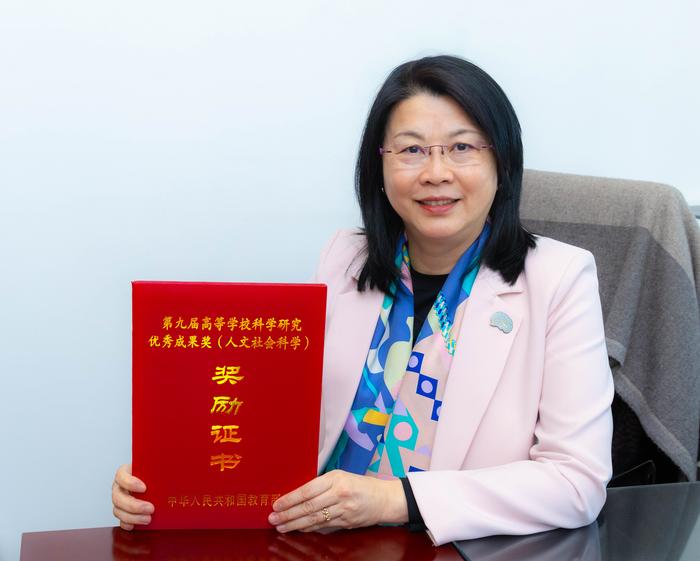Professor Tatia M.C. Lee, a distinguished researcher and Chair Professor of Psychological Science and Clinical Psychology at The University of Hong Kong (HKU), has recently been honored with the 9th Higher Education Outstanding Scientific Research Output Award, specifically the Humanities and Social Sciences (2nd Prize), by the Ministry of Education (MoE). This prestigious accolade recognizes outstanding contributions to academic research within the humanities and social sciences spheres in China. Professor Lee’s award is a testament not only to her intellectual rigor but also to her commitment to advancing knowledge in the field of psychological science.
The recognition stems from her landmark publication, titled “Qigong exercise enhances cognitive functions in the elderly via an interleukin-6-hippocampus pathway: A randomized active-controlled trial,” which appraised the impacts of Qigong—a traditional Chinese mind-body practice—on cognitive functions among older adults. Published in the highly esteemed journal Brain, Behavior, and Immunity, this research provides compelling evidence that engaging in Qigong exercises can significantly bolster cognitive capabilities in the elderly population by influencing physiological pathways associated with brain health.
The study involved a meticulously designed 12-week randomized controlled trial featuring a cohort of healthy older adults. In this trial, participants in the experimental group were assigned to practice Qigong, whereas those in the active control group were instructed to perform basic stretching exercises, which do not possess the meditative and integrative aspects inherent in Qigong. The research objectives centered around establishing whether the intricate mechanisms through which Qigong exerts its positive effects are linked to changes in the immune system and neurophysiology.
Over the course of the trial, participants who practiced Qigong exhibited not only enhanced processing speed and sustained attention but also a noted increase in hippocampal volume—a crucial brain region for memory formation and retrieval. Additionally, the study revealed significantly lower levels of Interleukin-6 (IL-6) in the Qigong group as compared to the control group. IL-6 is a pro-inflammatory cytokine that plays a critical role in the immune response, and its reduction has been associated with improved cognitive health, suggesting a beneficial role for Qigong in managing the effects of aging on brain function.
Professor Lee’s work comes at a time when the aging population globally is facing increasing challenges related to cognitive decline and neurodegenerative diseases. As conventional pharmacological interventions often yield mixed results and can carry adverse side effects, alternative approaches like mind-body exercises are gaining traction in both scientific communities and public health discourse. Highlighting these potential non-invasive interventions can pave the way for more holistic approaches to enhancing quality of life in older individuals.
Through her statement acknowledging the award, Professor Lee expressed sincere gratitude towards the Ministry of Education. She emphasized that such recognition is not merely an accolade but a reinforcement of the research team’s dedication to excellence and innovation in the academic arena. Their commitment to this line of inquiry underscores the importance of interdisciplinary collaboration in tackling the complexities surrounding cognitive health and aging.
Moreover, this accolade holds significance beyond individual achievement; it draws attention to the broader socio-cultural implications of integrating traditional practices like Qigong into contemporary psychological science. By bringing Eastern practices into the mainstream scientific discussion, Professor Lee’s research fosters a more inclusive understanding of health and wellness which transcends geographical and disciplinary boundaries.
The impact of Qigong extends beyond mere physical exercise; it embodies a comprehensive approach that includes mental engagement and emotional regulation, prompting a reconceptualization of how we understand the interplay of mind and body. The findings from Professor Lee’s research serve as a compelling endorsement of incorporating traditional practices into modern health paradigms, which can enhance cognitive resilience among the elderly.
The integration of such research into public health policy could be transformative, potentially influencing guidelines for cognitive health interventions among aging populations. As more studies arise validating these practices, the medical and psychological communities may increasingly advocate for non-pharmacological treatments that enrich everyday lives.
Moving forward, there is an urgent necessity to stimulate more research in related domains. The dynamics of cognitive function in aging, the neurobiological effects of Qigong, and the underlying mechanisms of inflammation warrant rigorous investigation. These inquiries could yield profound insights into improving cognitive aging and mitigating risks associated with age-related cognitive decline.
In conclusion, the recognition of Professor Tatia M.C. Lee not only accentuates the significance of her contributions to the field of psychological science but also heralds a shift towards a more integrative approach in research. It encourages scholars to explore the potential of interdisciplinary methods to enhance cognitive health across diverse populations, thereby crafting a healthier future for aging societies.
Subject of Research: Effects of Qigong on cognitive function in the elderly
Article Title: Qigong exercise enhances cognitive functions in the elderly via an interleukin-6-hippocampus pathway: A randomized active-controlled trial
News Publication Date: [Date of publication not provided in the original content]
Web References: [No web references provided in the original content]
References: [No references provided in the original content]
Image Credits: The University of Hong Kong
Keywords: Cognitive function, Qigong, Aging, Interleukin-6, Brain health, Clinical research, Psychological science, Neuropsychology.




